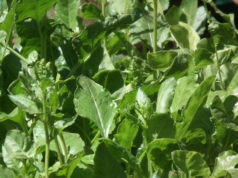
The world’s most consumed coffee species, Arabica, could be pushed to extinction in the wild in 70 years by the hand of climate change, according to a new study.
This isn’t to say that the coffee will no longer be available, because much of the Arabica coffee we drink in America is made from descendants of the plant. But the lack of wild crop could leave domestic crops genetically vulnerable to a host of enemies and thus lead to lower quality crops as well as higher coffee prices for consumers, according to National Geographic.
The study, conducted by London’s Royal Botanical Gardens, Kew, concluded that the prospects of the crop are “profoundly negative” and that even in the best-case scenario, two-thirds of suitable growing locations would cease to exist by 2080 when accounting for climate change alone. Ethiopia is the third-largest producer of Arabica coffee in the world and the mean annual temperature has risen by 2.3 degrees Fahrenheit since 1960, according to National Geographic. Arabica species are already living on the edges of ecosystems, and so the plants have nowhere to go when the temperatures rise.
The study identifies areas where Arabica has a chance to survive until at least 2080, and recommends a plan for conservation in these areas.
— Hayley Proctor
PARTING WITH PLASTIC BAGS
As in Boulder, Fort Collins city leaders are deciding whether to ban plastic shopping bags or require shoppers to pay extra for each bag they get from the store. This initiative is a part of the city’s efforts to reduce its environmental footprint and to cut the number of plastic bags that get caught in trees and fences.
City staff conducted a $5,000 study to examine how other cities have approached “bag bans.” The study looked into a “triple bottom line,” a term commonly used by cities to address the economic, environmental and social consequences of going green.
No final decisions on the matter have been made yet, but the Fort Collins City Council is scheduled to discuss the issue later this month.
— Adelina Shee














